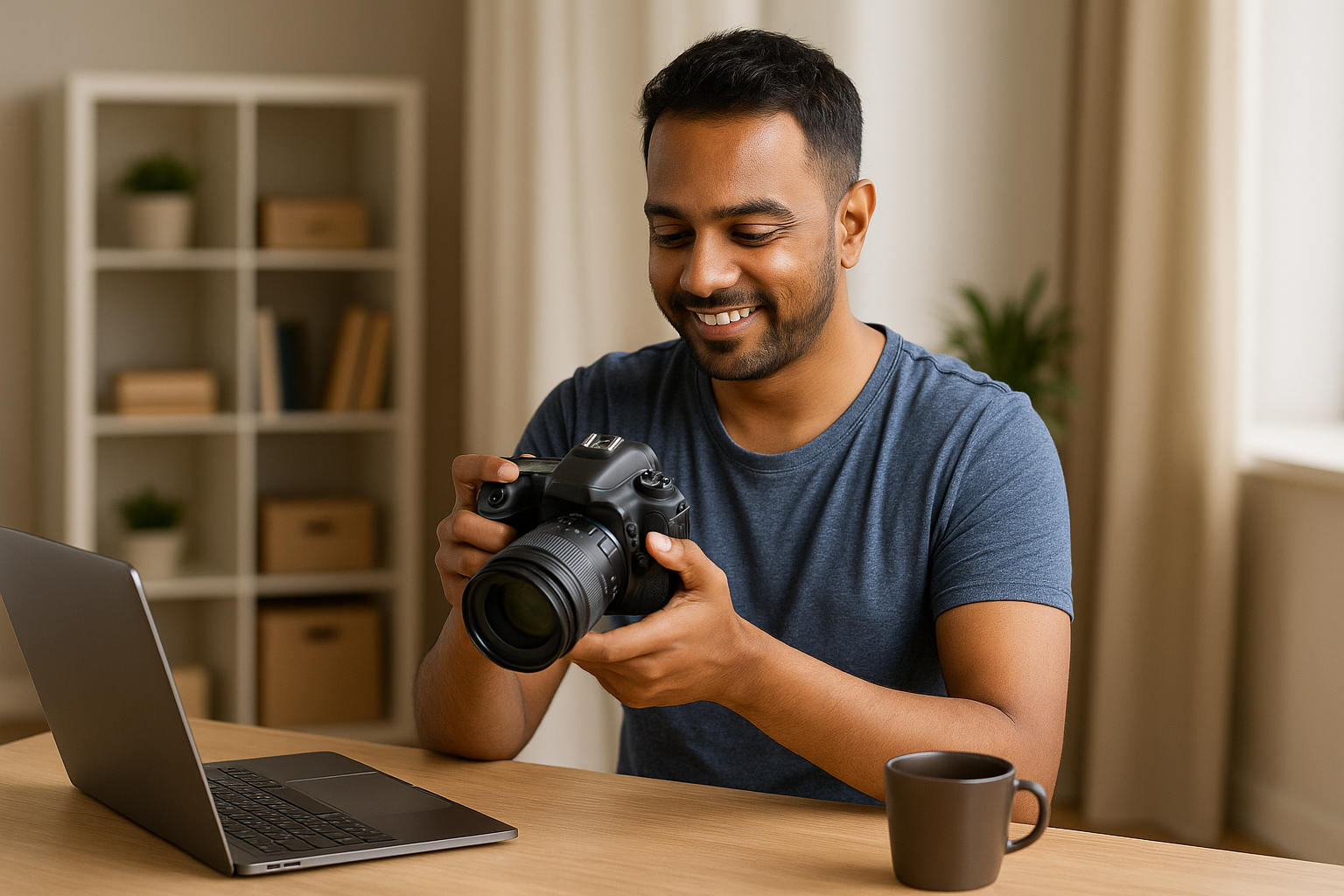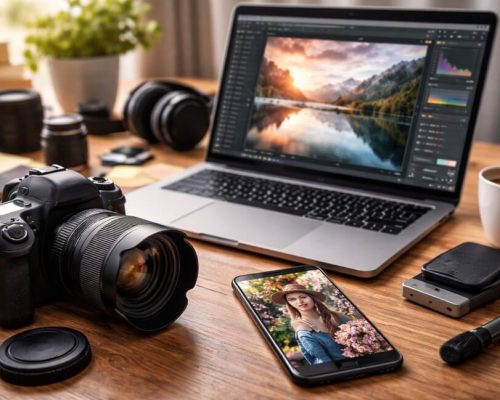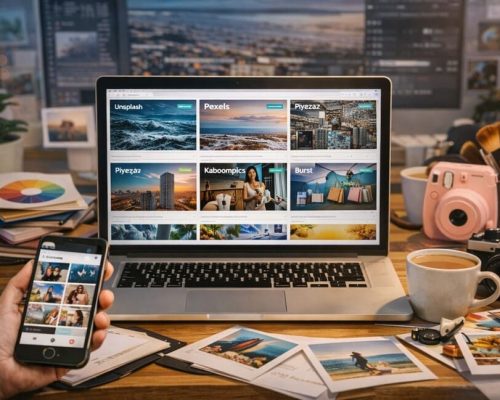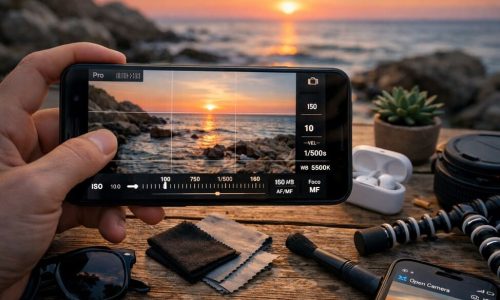Yes, You Can Start Earning Even If You’re Not a Pro (Yet)
You love photography. You’ve been practicing, learning, watching tutorials, sharing your work on Instagram, and maybe hearing from friends, “Wow, you should charge for this!” But the big question lingers: Can you actually make money from photography — even as a beginner?
The short and honest answer is: yes, you can.
No, you don’t need the most expensive gear. No, you don’t need ten years of experience or a fancy studio. What you do need is a realistic plan, a bit of boldness to put yourself out there, and a mindset that treats your creativity as something valuable.
Let’s break down practical, proven, beginner-friendly ways to earn money with your photography — even if you’re just starting out.
1. Start Where You Are, With What You Have
The perfect moment to start doesn’t exist
Too many beginner photographers fall into the trap of waiting: waiting for better gear, waiting to finish a course, waiting until they’re “good enough.” But truthfully, you don’t need to wait to start offering value.
Start with what you already enjoy shooting. Do you love capturing your pets? Offer pet photo sessions in your local area. Take portraits of friends. Photograph your neighborhood, local cafés, or nature trails. Use whatever camera you have — even if it’s a smartphone. What matters more than gear is your vision and your ability to connect with people.
2. Offer Affordable Sessions to Gain Experience
Practice with purpose (and payment)
You don’t need to charge hundreds of dollars for your first photoshoot. In fact, it’s often better to start with low-cost sessions while you gain real-world experience. These early jobs allow you to practice working with clients, handling lighting conditions, posing people, and managing post-production — all while building your portfolio.
Structure your first offers like this:
- 30-minute session
- 5 to 10 edited photos
- Quick turnaround
- Affordable price
Overdeliver and ask for a review or testimonial. This helps you build credibility and referrals. Even one satisfied client can become your best marketing tool.
3. Use Your Personal Network to Land First Clients
People around you want photos — they just need to know you offer them
Your first paid photography jobs probably won’t come from strangers on the internet. They’ll come from people who already know, like, and trust you.
Start close. Tell friends, family, and coworkers that you’re available for paid sessions. Offer “friends and family” pricing to get your foot in the door. Share your best shots on personal social media with a caption like, “Now booking portraits/pet photos/product shoots.” You don’t need a big audience — you need a few people who trust you and are willing to support your work.
4. Say Yes to Different Gigs to Discover Your Niche
Let your market choose your specialty
In the beginning, it’s okay to be a generalist. Take on a variety of jobs — portraits, couples, products, events, pets, food. You’ll learn what you enjoy, what comes naturally to you, and what the market is willing to pay for.
Over time, try to specialize. Specializing makes it easier to target your messaging and charge more. For example, being “a wedding photographer for intimate backyard ceremonies” is more powerful than just “a photographer.”
But remember, exploration comes first. You can’t find your lane if you never try different roads.
5. Sell Prints, Digital Art, and Stock Photos
Turn your passion into passive income
If you enjoy landscape, travel, street, or abstract photography, your photos may have value as decor or digital products. There are many platforms that let you sell your work in print or digital formats.
Start by uploading your best shots to:
- Etsy (for prints and digital downloads)
- Redbubble or Society6 (for printed products)
- Picfair or 500px (for licensing and stock)
You can also create your own online store using Shopify or a simple portfolio site. Promote your shop casually through your social media or email list. Even if it starts slow, this can grow into recurring, passive income over time.
6. Photograph Local Events and Celebrations
Small events need great photos too
Not every event is a big wedding or corporate gala. Think small: birthday parties, baby showers, local music nights, school events, or small business openings. These often go unphotographed — or worse, end up with only blurry phone photos.
Reach out to local event planners, businesses, and community groups. Offer to cover their next event with a small portfolio package. You’ll not only earn money but also expand your network quickly, since events put you in front of lots of people.
7. Offer Personal Branding Shoots for Creators and Entrepreneurs
Everyone needs good photos now
We live in a visual world. Entrepreneurs, freelancers, coaches, and influencers all need professional images for their websites, Instagram, LinkedIn, and newsletters. That’s where you come in.
Branding shoots are perfect for beginners because they can be:
- Short (30–60 minutes)
- Local (parks, cafes, home offices)
- Casual but impactful
Market these as “starter branding sessions” with 10–15 edited photos. Make it affordable, quick, and fun — and your clients will likely come back every season.
8. Work with Small Businesses and Local Shops
Help others grow while growing yourself
Many small business owners can’t afford big marketing agencies, but they still need quality photos. Offer to shoot their products, staff, interiors, or even create social media content bundles.
Reach out with a friendly message and a few examples of your work. You might say: “I’d love to help showcase your products with high-quality photos for your Instagram. I’m building my portfolio and offering special rates this month.”
A few happy clients here can lead to long-term collaborations — and even retainers if you offer monthly content.
9. Join Freelance Marketplaces and Job Boards
Remote work opportunities for photographers are growing
Even if you’re not ready to shoot big gigs, you can offer editing, retouching, or image consulting services online. Many photographers make a side income by:
- Retouching portraits
- Editing product photos for online shops
- Color correcting wedding galleries
- Creating custom photo presets or LUTs
Use platforms like:
- Upwork
- Fiverr
- Freelancer.com
- PeoplePerHour
Be honest about your level, start with small jobs, and build a 5-star reputation. Every project you complete increases your confidence and skill.
10. Build a Simple, Powerful Online Portfolio
Look professional, even as a beginner
Having a portfolio makes a big difference in how people perceive your work. Even if you only have 10 great images, present them well — and you instantly look more credible.
You can use platforms like:
- Wix
- Squarespace
- Format
- Adobe Portfolio (free with Creative Cloud)
Include:
- Home page with a clear message
- About Me section with a photo
- Portfolio organized by category
- Contact form
- Testimonials (even from early clients)
You don’t need to wait until it’s perfect. Launch now, improve later.
11. Promote Your Services on Social Media (Authentically)
You don’t need to go viral — just be visible
Social media is a powerful tool to grow your photo business, but you don’t need to post daily or create reels 24/7. The goal is not to be an influencer. The goal is to connect with potential clients.
Here’s what works:
- Share one great photo per week
- Tell the story behind it
- Show behind-the-scenes when shooting or editing
- Celebrate client wins
- Use clear captions and contact info
Over time, people will start recognizing your style and trusting your expertise. Stay consistent and honest — your audience will grow organically.
12. Teach What You’re Learning
You don’t need to be an expert to help others
As you grow in your photography journey, you’ll realize how much you’ve already learned. You can share this with others — and even get paid to do it.
Some beginner-friendly teaching ideas:
- Host a smartphone photography workshop
- Offer one-on-one editing tutorials over Zoom
- Create a beginner’s ebook or mini-course
- Run a local photo walk
Teaching not only brings in income — it cements your own knowledge and builds your reputation as a trusted voice in photography.
Conclusion: Turning Your Passion Into Profit Starts With Belief
You don’t need to wait years or earn a diploma to start getting paid for your photography. You just need to believe that what you create has value, and be willing to offer that value to real people.
Whether it’s portraits for families, content for small businesses, or selling your own art prints — there are dozens of ways to turn your hobby into income. The path won’t be instant, but if you stay consistent, kind, and curious, your camera can become more than a creative outlet — it can become a source of freedom.
And remember: you’re not just selling photos. You’re helping people capture memories, elevate their brand, or see the world a little more beautifully.
So go ahead — take that next step. The world needs your vision.











